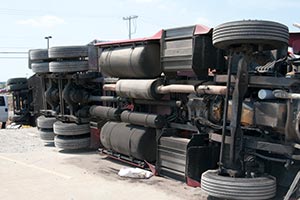
A truck rollover accident (also called an “overturn”) happens when a truck loses its balance and tips or rolls over onto its side or top. Any kind of vehicle can roll over, but big trucks like as semi-trailers and tank trucks are particularly at risk for overturns. In 2017 there were more than 10,000 rollover truck accidents in the United States according to federal statistics. U.S. Government data indicates that a rollover was the first harmful event in 3% of big truck crashes not involving a fatality and 4% of truck crashes where someone died that year. According to Federal statistics driver error was a factor in almost 80% of rollover crashes.
Truck rollover accidents often happen in curves and on highway entrance and exit ramps. Trucks naturally lean to the outside when going around a curve. As the curve of the road and speed increase so does the truck’s tendency to rollover. Truck drivers can misjudge curves and go to fast through them setting up the conditions for a rollover. An experienced lawyer should be familiar with this.
 A critical factor in a overturn truck accident is the truck’s “center of gravity”. This is the point on the vehicle where weight is most ‘centered’. Taller vehicles usually have higher centers of gravity – that is to say, their weight is centered higher above the ground than that of regular passenger cars. This makes tall vehicles like 18 wheelers more prone to toppling over. The length of the truck matters. Shorter trucks have a greater likelihood of being involved in a rollover truck accident than longer trucks. Trucks with lower centers of gravity and stiffer suspensions are less subject to rolling.
A critical factor in a overturn truck accident is the truck’s “center of gravity”. This is the point on the vehicle where weight is most ‘centered’. Taller vehicles usually have higher centers of gravity – that is to say, their weight is centered higher above the ground than that of regular passenger cars. This makes tall vehicles like 18 wheelers more prone to toppling over. The length of the truck matters. Shorter trucks have a greater likelihood of being involved in a rollover truck accident than longer trucks. Trucks with lower centers of gravity and stiffer suspensions are less subject to rolling.
The trailer usually has a higher center of gravity, is usually more flexible and more subject to forces which cause rollover truck accidents than the tractor part of an 18 wheeler. Many of the heavier parts of the tractor like the engine, transmission, differential, drive axles and fifth wheel are located in the lower part of the tractor giving it a lower center of gravity and making it less subject to rollover over than the trailer.
On a semi the tractor is typically connected to the by a “fifth wheel” and “kingpin”. The fifth-wheel is an assembly on the back of the tractor which looks like a big round metal plate. A big metal pin under the trailer (the kingpin) goes into the fifth-wheel. Jaws on the fifth-wheel close around the kingpin securing the trailer to the tractor.
Rollover truck crashes, (not to be confused with jackknifed crashes) involving semi-trucks often start with trailer. When the forces increase (like when a semi goes around a curve too fast) they can cause the trailer, which usually has the lower center of gravity, to start the overturn. As the trailer continues to rollover it can pull the tractor with it causing the whole semi-truck to flip and creating the rollover truck accident. During some truck rollover accidents the trailer may separate from the tractor during the rollover resulting in the only trailer rolling and the tractor remaining upright.
The manner in which the cargo is loaded and secured is another key issue. Cargo shifting or moving while the truck is in motion can affect it’s balance and cause a rollover truck accident. There are extensive rules for how cargo is to be loaded and secured designed with the goal of preventing these problems. In some cases load shifting in a rollover truck accident may be a result of the rollover and not the cause.
Probably the most obvious danger to other vehicles is if a large truck rolls over onto your vehicle. Fully loaded tractor-trailers can weigh 80,000 lbs. or more. With a truck of that weight falling on you the potential for a fatal truck accident or one with catastrophic injury is all too real. That happened in the Kansas City area a number of years ago when a semi loaded with candy landed on an adjacent car crushing and killing the occupant.
Overturned truck accidents can also happen if one of these trucks rolls over and obstructs traffic on a road or highway. Other vehicles on the road may be unable to stop in time to avoid crashing into the truck. This danger is even greater in reduced visibility conditions like darkness at night or fog. The truck’s lights, reflectors and conspicuity tape are most effective when the truck is upright as normal. When a truck is on its side the effectiveness of these devices is dramatically reduced to the point that in darkness or other low visibility situations other vehicles may not realize that a truck in obstructing the road until it is too late.
Why Rollover Accidents Happen
What causes semis and other large trucks to rollover? Some of the top causes are:
- Speed – Speed is a probably the number one contributor to such crashes. This can mean either exceeding the posted speed limit or driving too fast for road conditions. Due to the sheer size and weight of large trucks, higher speeds pose a greater risk for imbalance. In fact, the Federal Motor Carrier Safety Administration (FMCSA) once found that nearly 50 percent of truck rollovers are due to a failure to adjust speeds. 2/3 of truck rollovers related to speed happen on curves. Reducing speed on curves and ramps can reduce this risk. Truck drivers are advised to slow down to at least 10 miles per hour below the posted speed prior to a curve or ramp if there is no special speed limit for trucks posted.
- Cargo – Even the most careful truckers can find it difficult to safely maneuver their vehicle if the cargo is improperly loaded. Cargo should be distributed evenly on the truck, loaded as low as possible and checked periodically to make sure that it is still secure and has not shifted. Loading and cargo securement errors include overloading, underloading, and inadequate securing of the freight. Cargo which is not properly secured can shift in transit causing the truck to become unbalanced and setting up the conditions for a rollover. Tank truck drivers need to be particularly attentive as their liquid cargo can easily slosh in the tank creating weight imbalances with the potential for a tanker rollover. Heavier loads can make a truck more likely to roll.
- Driver fatigue and inattention – Driver fatigue is a major contributor to overturn truck crashes. Truck drivers must pay full attention when operating their vehicle as large trucks take longer to stop and are more difficult to maneuver. The FMCSA also cites various forms of inattentive driving such as being distracted and dozing off at the wheel. Unfortunately, too many truckers ply our roads while being distracted by devices or falling asleep due to fatigue and being overworked. To help avoid these problems truckers are advised to make sure they eat properly, are well rested and take sufficient breaks so they can maintain alertness.
- Improper turning – Heavy trucks need to slow down when making a turn. Truckers should also be skilled enough not to understeer nor oversteer when navigating a curve. According to the FMCSA, one of the riskiest factors for trucks trying to turn is the misjudgment of the driver.
- Reentering the road- Re-entering a higher roadway from a lower shoulder are a common cause of rollovers.
- Soft Road Shoulders. Part of the truck weaving from a flat, even roadway onto a soft shoulder, especially at speed can begin a rollover truck accident.
- Sudden stops and starts – When a cargo truck makes a sharp movement, its load can shift in an instant, abruptly changing the balance of the vehicle.
- Sudden maneuvers. Quick lane changes, evasive maneuvers to avoid animals or other road hazards can set the stage for a rollover.
- Mechanical defects – Critical components of large trucks include the brake systems, suspension systems, and tires. Such components must be properly inspected and maintained before a truck goes on a trip. Tire pressure and condition are particularly important because of the impact that improperly inflated, worn or damaged tires can have on truck handling and control. Suspension problems like collapsed suspension components can affect handling and stability and be a factor in rollover truck accidents. Brakes that don’t work properly can exert unbalanced brake force and affect the handling of the truck.
- Road Issues Deep potholes, low shoulders, and inherently bad road design are some of the external hazards that can cause truck imbalance.
- Weather – While a trucker cannot control the weather, they or their company should carefully consider any wind advisory, watch, or warning issued by from the National Weather Service for high profile vehicles. A strong wind on an elevated roadway can turn a large truck on its side in an instant.
Duties of Trucking Companies and Truckers in Preventing Overturns
Over the decades, safety regulations and systems have been developed to reduce the risk of rollover truck accidents. Many of these safety measures have been incorporated into the Federal Motor Carrier Safety Regulations (FMCSRs) The following are some important rules that truck drivers and trucking companies must follow:
- Trucking companies are required to hire only qualified properly licensed truck drivers with adequate training and skills.
- Observing speed limits and driving at a speed appropriate for road conditions, the type of truck and load being transported.
- “Hours-of-service” rules limit truckers working and driving hours and help avoid crashes caused by fatigue.
- Rules limiting or prohibiting truck operation in hazardous conditions.
- Requirements for electronic stability control (ESC) systems, a computer-controlled mechanism designed to reduce rollovers.
- Trucks must be well-maintained and inspected before every trip.
- Specific, detailed rules for the proper loading and securing cargo.
- Chains, straps, tie-downs and other secure cargo equipment must be in proper condition.
In most cases truck drivers are required to stop enroute periodically and check that the cargo is still properly secured.
Why A Lawyer with Specialized Truck Accident Experience and Training May Be Crucial to Your Case
18 wheeler and other large truck crashes are significantly different from regular auto accident cases. For the best result in your truck injury claim, hiring an attorney who has specialized training for large truck accidents and substantial experience in handling real-world truck crash cases can be very important.
Trucking accidents can be much more challenging to investigate, given the complex mechanisms of large trucks and the potentially catastrophic nature of their wrecks. There are also specific regulations (like the FMCSRs) and laws that apply to trucking which often require specialized knowledge and in depth understanding.
Another major consideration in truck accident cases is the involvement of trucking companies, their insurance carriers and attorneys. Most of the large trucks we encounter on the road today are commercial vehicles. If one of these commercial trucks is involved in your crash, the motor carrier will likely be involved in the case. You could be faced with a savvy, knowledgeable and well-resourced defendant in addition to well trained and experienced insurance adjusters who know trucking cases. An experienced attorney can be important to help you level the playing field.
We at the Flick Law Firm use our in-depth knowledge, extensive resources and commitment to help ensure that our clients get the compensation they need and deserve.
Don’t Delay – Contact Us Today
There are time limits to filing an accident injury lawsuit. Don’t risk losing your right to receive compensation – learn about your legal options as soon as you can.
Your consultation with us at the Flick Law Firm regarding your rollover truck accident injury is free. Call us today at (816) 221-0501 or simply fill out our Contact Us Form.










